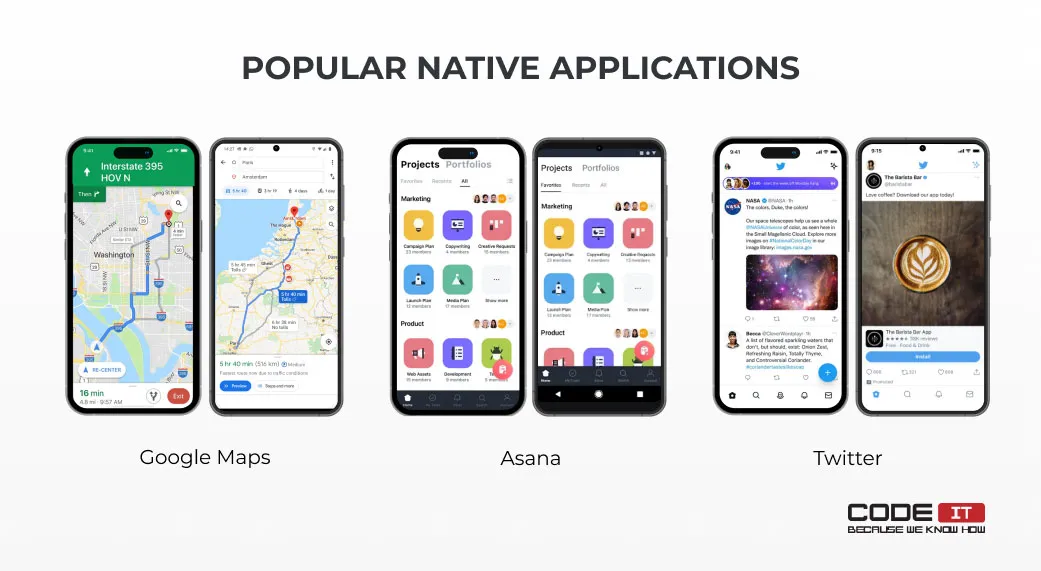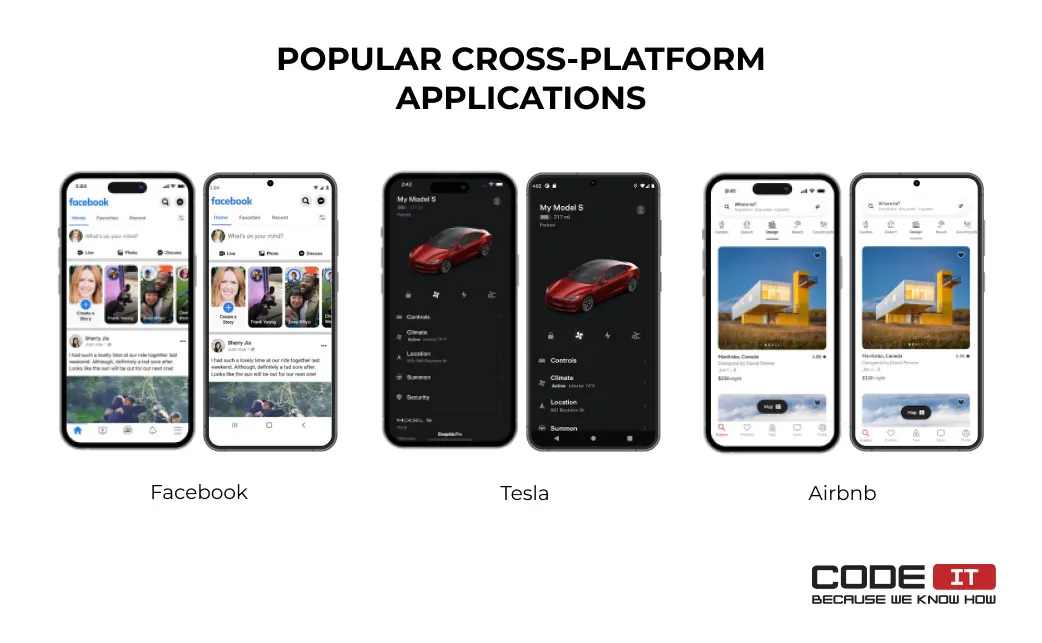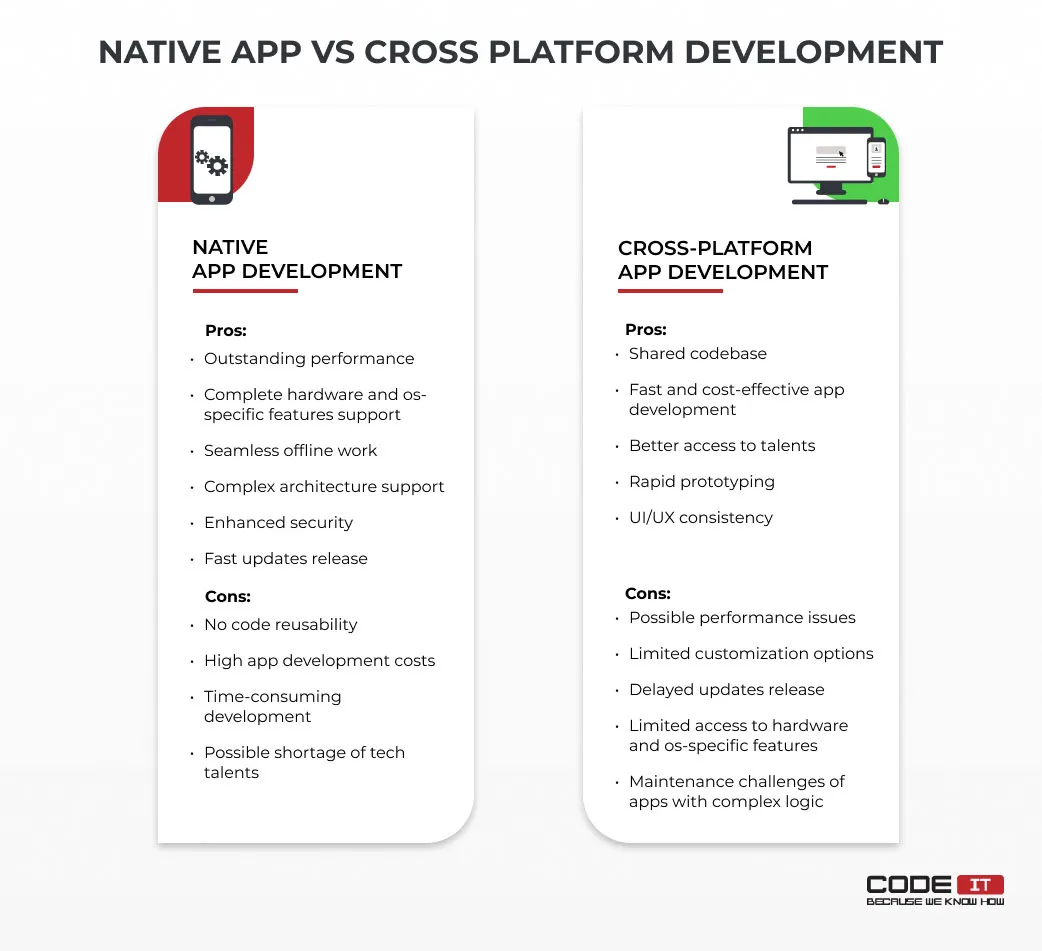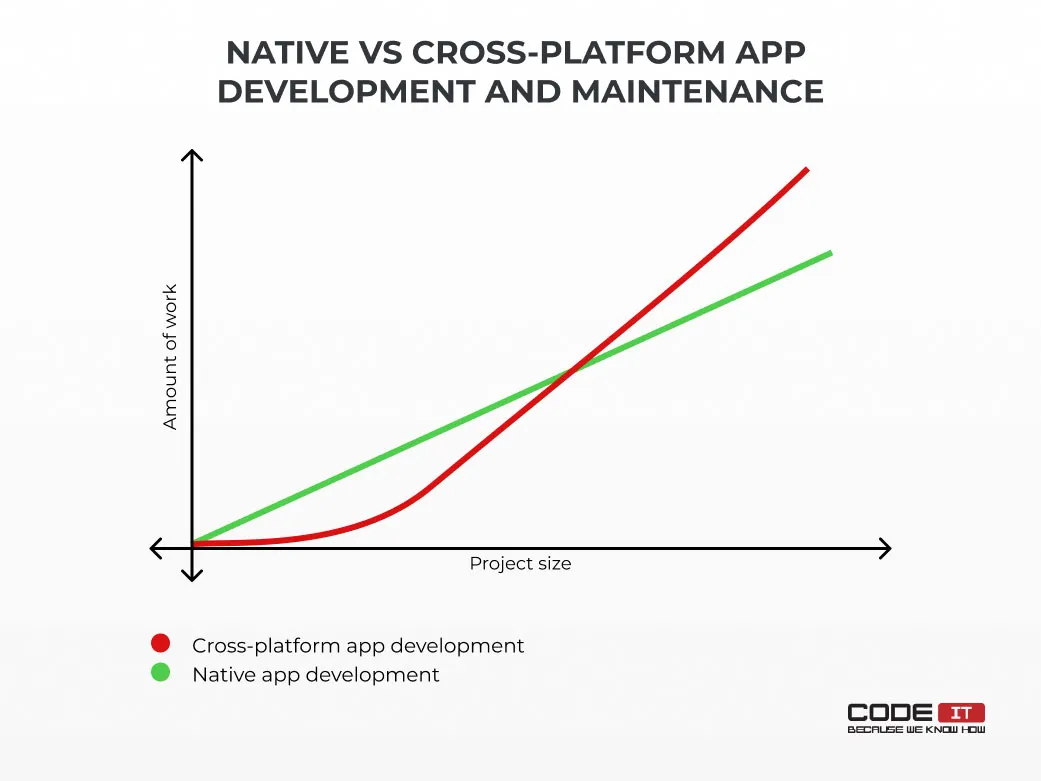Cross-Platform vs Native Mobile Development


Native apps are distinctive applications targeted for specific platforms, commonly iOS and Android. They are developed by separate teams who need to use different tools and programming languages.
Cross-platform apps can work on multiple platforms using a single codebase. Many frameworks and programming languages can be used to develop cross-platform applications.
Basics: Cross-platform Vs Native Development
Considering the cross-platform vs native mobile development approach may be challenging.
Therefore, let’s briefly explore the strong sides and key peculiarities of native and cross-platform development approaches in the post below.
Native App Development
The native app development approach needs you to select a targeted platform, whether it is iOS or Android. An application for every platform should be developed, tested, and released separately.

Two teams of software engineers should be involved in developing native apps for iOS and Android devices.
The key peculiarities of native apps are:
- Top performance
- Full access to hardware and os-specific features
- Seamless offline work
- Top-tier UI/UX
Since two teams should be involved, native apps may have different UI/UX designs and features.
Cross-Platform App Development
The cross-platform development approach foresees the opportunity to write the code once and release iOS and Android applications simultaneously.

Software engineers should use a framework to build a cross-platform application. Some frameworks foresee the opportunity to develop mobile, web, and desktop applications using a single codebase.
The core advantages of cross-platform app development are:
- Fast and cost-effective development
- Single codebase
- High performance
- Better access to developers
iOS and Android mobile applications should be released separately.
It’s vital to understand that native vs cross-platform app development doesn’t include the hybrid approach. Hybrid mobile apps are web apps wrapped into native layers to work on mobile devices.
Looking for a skilled expert to develop a top-tier mobile application?

Business First
Code Next
Let’s talk
Native Vs Cross-platform App Examples
Many popular mobile applications were developed by applying native and cross-platform development approaches.

Popular native applications are:
- Google Maps — One of the most popular navigation apps
- Asana — A popular team and task management mobile app
- Twitter — A top social media platform application

The top cross-platform apps examples are:
- Facebook — The most popular social media app
- Tesla — An app for managing Tesla vehicles and other products
- Airbnb — A leading booking application
Both native and cross-platform applications have rich user interfaces and many distinctive features. These days, it’s hard to distinguish native applications from cross-platform apps visually, which makes the cross-platform mobile development vs native approach selection complicated.
Develop a cross-platform mobile application fast with CodeIT!

Business First
Code Next
Let’s talk
Cross-platform Vs Native Mobile Development: Pros, Cons, And Tools
Many factors should be considered when selecting a cross-platform mobile development vs. the native approach. Explore the pros and cons of each method in more detail below.

Native App Development
Native app development is widely considered by businesses that need to build well-optimized applications with complicated logic.
Pros
The approach’s benefits are the following.
- Outstanding performance. Native mobile applications are well-optimized. They can run smoothly on targeted platforms, achieving maximum performance.
- Complete hardware and os-specific features support. Native apps can directly access and use all hardware of smartphones, like a camera, microphone, or GPS module. Also, developers can enable 100% of os-specific features in native applications.
- Seamless offline work. Network connectivity isn’t a requirement for native applications. They can seamlessly work offline.
- Smooth UI/UX. All design elements that match a platform’s guidelines can be displayed in native applications. Also, they support custom animations and gestures.
- Complex architecture support. The native app development approach is the only available option to develop mobile applications with complex architecture, data flows, and distinctive features.
- Enhanced security. Tools that software engineers use to develop native applications offer access to in-built security features.
- Fast updates release. Native app developers can create new features as soon as new OS updates become available for software engineers.
Cons
The main disadvantages that may convince you to consider another app development approach when comparing cross-platform vs native (iOS and Android) are as follows.
- No code reusability. A single codebase can be used for one targeted platform only. Therefore, businesses need to involve separate iOS and Android teams to develop mobile apps for the two most popular platforms.
- High app development costs. Since multiple teams of developers with specific tech skills should be involved, the cost of building a native app is higher than other approaches.
- Time-consuming development. Developers need to write, review, and test more code. Also, two distinctive applications should be released, which can make the native app development time-consuming.
- A possible shortage of tech talents. Native app programming languages and developers’ share are as follows: Swift – 4.8%, Objective-C – 2.8%, Kotlin – 9.2%, Java – 33%. Hence, it may be challenging to find developers with the required expertise.
Tools
Developers need to use the following tools and technologies.
| iOS | Android | |
|---|---|---|
| Tools | Apple Xcode | Android Studio and Android Developer Tools |
| Programming Languages | Objective-C, Swift | Java, Kotlin |
Cross-Platform App Development
Multi-platform app development helps rapidly create mobile applications targeted for different operating systems to reach a larger audience.
Pros
The key benefits of the cross-platform development approach are:
- Shared codebase. A single codebase is used to develop applications for multiple platforms.
- Fast and cost-effective app development. One team of software engineers is involved in developing multiple mobile applications.
- Better access to talents. The cross-platform development approach helps access a large number of software engineers. JavaScript is the most popular programming language used by React Native, a popular cross-platform development framework.
- Rapid prototyping. Many pre-built components foresee the opportunity to develop app prototypes fast.
- UI/UX consistency. Since a single codebase is used, applications have consistent UI/UX on different platforms.
Cons
The primary limitations of cross-platform developments are:
- Possible performance issues. Cross-platform applications can hardly achieve native-like performance due to a lack of optimization. Moreover, possible performance issues may occur in the case of complex user interfaces.
- Limited customization options. Frameworks may not offer access to all native UI components. Also, there are possible issues with custom animations and gestures.
- Delayed updates release. Frameworks should be updated to enable software engineers to develop new features. It causes additional delays in the production and release of app updates.
- Limited access to hardware and os-specific features. In most cases, native code should be used to access devices’ hardware and os-specific features.
- Testing and maintenance challenges of apps with complex architecture. It’s vital to use cross-platform native code to develop applications with complex architecture. The testing and maintenance of multi-platform apps with native code are challenging.
Tools
The three most popular cross-platform mobile development frameworks are Flutter, React Native, and Xamarin.
| Programming Language | Flutter, Dart | React Native, Javascript, TypeScript | Xamarin, C# |
| Supported Platforms | iOS, Android, Linux, macOS, Web, Windows | iOS, Android | iOS, Android, Windows |
| Performance | High | Moderate Possible performance issues | High |
| Custom Animations and Gestures | Supported | Moderate | Not supported |
| Developers Availability | Low | High | Middle |
| Key Peculiarity | A large number of pre-built widgets and animations | Reusable components | Fast prototyping |
What To Choose: Cross-platform Vs Native Mobile Development
The process of considering native vs cross-platform mobile development needs you to consider a lot of factors, including business goals, capabilities of frameworks, etc. At CodeIT, we recommend considering the following.
- Short-term and long-term goals. Analyze your product vision to understand the business goals to achieve clearly. Discover if you will need to develop additional features in the future, increasing the complexity of an app’s architecture. Also, consider if you will need to develop desktop and web applications.
- Features and app architecture complexity. Create a feature set to discover if any cross-platform mobile development frameworks support them. Also, analyze an app’s architecture to understand whether it can be developed without native code if you choose cross-platform app development.
- Budget and time frames. Define the time and budget that can be allocated to mobile app development.
- Existing solutions. Analyze your existing solutions and how they can facilitate mobile app development. For instance, having an existing web app built with the React.js library, a cross-platform app can be developed rapidly using React Native.
- Access to tech talents. Consider the expertise of software engineers in your team. Otherwise, analyze your access to developers with native or cross-platform development expertise.
Native vs Cross-Platform Mobile Development and Maintenance
Developing and maintaining a cross-platform application with basic functionality is more profitable. However, it’s cheaper to build and maintain native applications in the long run. Check out the comparison of the native app vs cross-platform comparison chart below.

Developers’ Availability and Salaries
The access to software engineers is crucial to analyze when considering a native vs cross-platform app development approach.
Let’s briefly compare the availability and salaries of tech talents according to the Stack Overflow Developer survey.
Native app developers need to be divided into two teams that use different tools and technologies.
| Platform | Programming Language | Developers’ Availability | Average Salary |
|---|---|---|---|
| iOS | Objective-C | 2.8% | $83,165/year |
| iOS | Swift | 4.9% | $78,468/year |
| Android | Java | 33.3% | $64,572/ year |
| Android | Kotlin | 9.2% | $69,318/year |
Cross-platform app developers can develop work in one team to develop iOS and Android applications using selected tools and technologies.
| Framework | Supported Platforms | Programming Language | Share of Developers | Average Salary |
|---|---|---|---|---|
| Flutter | iOS, Android, Linux, macOS, Web, Windows | Dart | 6.54% | $43,724/year |
| React Native | iOS, Android | JavaScript | 65.4% | $65,580/year |
| React Native | iOS, Android | TypeScript | 34.8% | $70,276/year |
| Xamarin | Android, iOS, and Windows | C# | 28% | $69,516/year |
When To Choose Native App Development
Opt for native mobile application development in the following cases.
- You need to build an application targeted for one platform only
- You strive to achieve the maximum app performance
- An app will have a complex architecture
- An app’s functionality will be significantly enhanced
- An app will have many distinctive features
- An app should have a smooth UI/UX design
- An app should seamlessly work offline
When To Choose Cross-Platform App Development
Choosing the cross-platform app development approach is advisable in the following cases.
- You need to build a mobile app that works on different platforms
- You need to develop a prototype fast
- You have a limited budget or a tight schedule
- Your application will have basic functionality
- You don’t plan to evolve an application by releasing new features
- You already have or plan to develop a web or desktop application
There is no 100% reliable instruction on considering cross-platform vs native mobile development. Many factors can affect the final decision.
Native app development refers to building distinctive mobile apps targeted for different platforms separately. It is perfect for businesses with a long-term app development strategy. This approach should be selected by companies that want to develop applications that will:
- have a complex architecture
- have many distinctive features
- need to receive new updates fast
Cross-platform app development refers to building mobile apps that work on different platforms using a single codebase. This approach is perfect for creating a prototype or application with a simple architecture and basic functionality.
FAQ
Native app development refers to the process of building separate mobile applications targeted for different platforms. Distinctive technologies are used to build mobile apps for iOS and Android.
Cross-platform app development refers to building mobile applications that work on multiple platforms using a single codebase. A framework should be used to create a multi-platform application.
The native app development approach helps develop well-optimized applications. However, building native apps is more expensive and time-consuming than the cross-platform approach. They have to do performance, functionality, and UI/UX.
The main difference between native apps vs cross-platform applications lies in the purpose of selecting an approach.
Native app development is best for creating mobile top-performing applications with complex architecture.
Cross-platform app development is best for creating prototypes and mobile applications with basic functionality.
Many factors may affect the final decision when considering native vs cross-platform mobile development. We recommend analyzing the following:
- Short-term and long-term goals
- Budget and time frames
- Features and app architecture complexity
- Existing solutions
- Access to tech talents
The main advantages of the multi-platform development approach are:
- Shared codebase
- Fast and cost-effective app development
- Better access to talents
- Rapid prototyping
- UI/UX consistency
The foremost native app development pros are:
- Outstanding performance
- Complete hardware and os-specific features support
- Seamless offline work
- Smooth UI/UX
- Complex architecture support
- Enhanced security
- Fast updates release
The three most popular cross-platform mobile development tools are:
- Flutter
- React Native
- Xamarin
Build your ideal
software today






